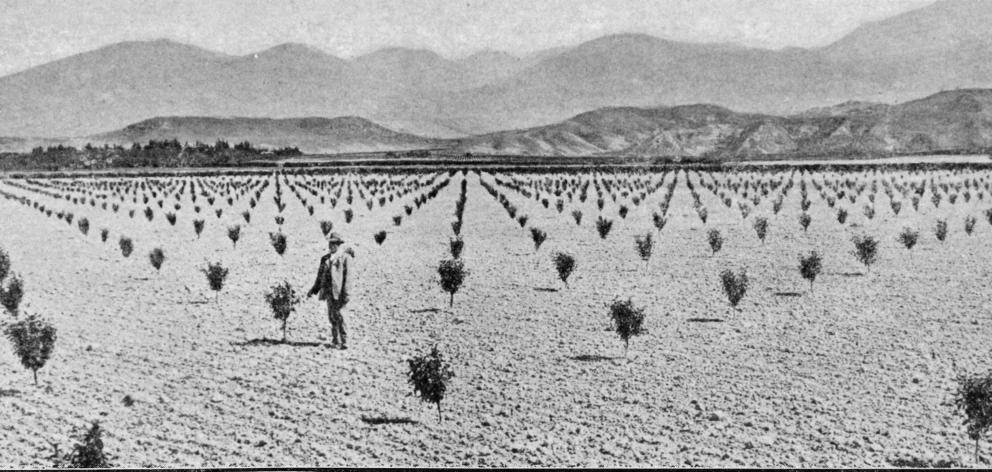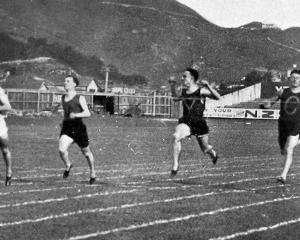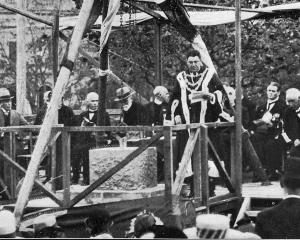
She was therefore the oldest living New Zealand-born European at the time of her death, which occurred at Dr Walker's Private Hospital, Whangarei, at 7 o'clock a.m. on June 23.
At the time of her birth her father had large business premises at Wahapu, opposite Paihia, but settled permanently at Deveron, Whangarei, on the last day of 1842. The Bay of Islands in those early days was the rendezvous of all vessels visiting the Southern Pacific Seas, and during her girlhood Mrs Bedlington was the eye-witness of many tragic and stirring events, besides becoming personally acquainted with all the notable visitors to that part of the country, who were generally entertained at her parents' residence. Gifted with great intellectual powers and a wonderful memory, she could recall many incidents in the life of the Rev. Samuel Marsden, who was justly named ``The St. Augustine of Christianity in New Zealand'', and who made his last visit to Wahapu in 1837. She met the members of Sir James Ross's Antarctic expedition in H.M. Erebus and Terror, which visited Wahapu in 1839-41. Lieutenant (afterwards Admiral) McClintock, the discoverer of Sir John Franklin's lost Arctic expedition, was one of the officers.
She remembered the arrival of the Chevalier Dillon, who afterwards discovered the remains of the ill-fated expedition of La Perouse, wrecked on the Mallicolo Islands, New Hebrides; also of Lady Franklin, wife of the intrepid navigator; Bishop Broughton, the first Church dignitary of that rank who came from New South Wales to open and consecrate the church at Kororareka, now called Russell; also the coming of H.M. Beagle, under Captain Fitzroy, with the great English scientist Charles Darwin and Sir William Hooker, the latter afterwards director at Kew. She also made the acquaintance of Allan Cunningham, the eminent botanist, from whose teachings she and her brothers and sisters acquired their love of our beautiful native flora. On one occasion she accompanied her parents on board the corvette Vincennes, the brig Porpoise, and the sloop Flying Fish, which formed the American exploring expedition under Commodore Withers.
Mrs Bedlington was present at the landing from H.M. Rattlesnake of Captain Hobson, R.N., our first Governor, and with her parents witnessed the signing of the Treaty of Waitangi. She was greatly impressed by the historic scene, the hoisting of the British flag amid the thundering cannon, and the soul-stirring war dances of the fierce Maori warriors, under their dignified-looking tattooed chiefs. She remembered the Sunday morning on which the noble missioner of Christianity, Bishop Selwyn, landed at Paihia, and she listened to the eloquent sermon he preached in Maori, the language having been mastered by him on the voyage out from England.
Pastoral tenure
Somewhat overwhelming, in respect both of their volume and their variety, were the representations that were made to local members of Parliament on Monday night concerning public matters of special interest to Otago and, in most cases also, of general importance. One of them, which has not been discussed to more than a small extent, certainly affects the future welfare of Otago in greater measure than most of the more frequently ventilated proposals for promoting the interests of the provincial district. That is the question of the tenure of pastoral runs. It is, as was shown by Mr Todd, who introduced the subject, peculiarly an Otago question since the proportion of Crown lands held under pastoral license in Otago is considerably greater than in any other district in the dominion. The blot upon the pastoral license is that it offers no real encouragement to the runholder to effect improvements and to increase the carrying capacity of the land. It is to be acknowledged that as the result of legislation which was enacted some years ago the conditions of the license have been liberalised. Even now, however, they are not of a kind to induce the holders of pastoral country to expend money freely in the improvement of the land they occupy.
Hearing fixed
The medical examination of recruits has proved a blessing to some men (writes the Rakaia correspondent of the Christchurch Press). One man, who was rejected several times on account of defective hearing, at last got the examining doctor to investigate the reason why he could hear well sometimes and not at others. On investigating the ear the doctor found a quantity of indelible blue lead pencil. The recruit than remembered having at school idly twisted the pencil round in his ear and some of the point breaking off. On the ear being syringed out the man became a soldier with perfect hearing. - ODT, 27.6.1917.












